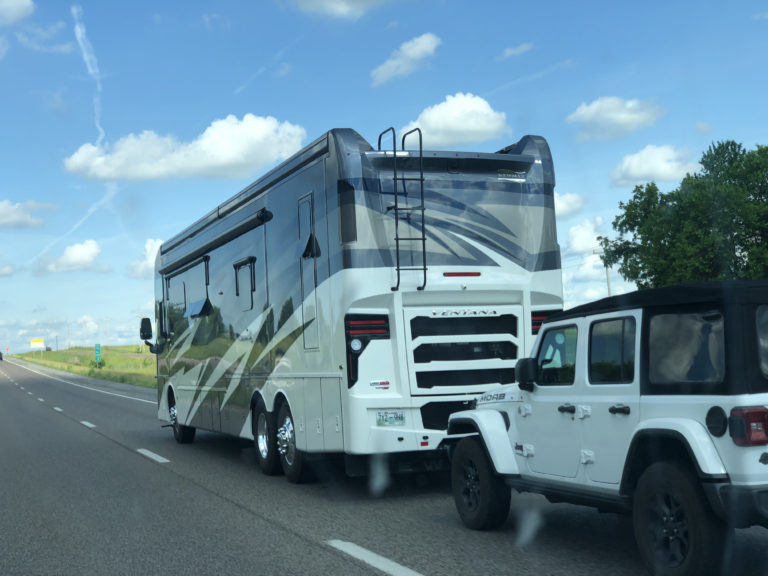11 Questions You Must Ask to Reserve the Perfect RV Campsite
NOTE*** The content on this page may contain affiliate links, we may make a commission. And, as an Amazon Associate, we earn from qualifying purchases. More information: disclosure page.
Planning an RV vacation for the first time comes with lots of new challenges. Part of planning your trip will be reserving campsites. RV campgrounds come in many different shapes and sizes. You will need to know some questions to ask before you go camping.
Since this is new you will need to know a few things and the right questions to ask in order to reserve a campsite.
In fact, if you have your heart set on a certain campground you may want to look into some of this information about the campground before renting an RV.
For example, many national parks have a size limit on the length of RV that you can camp. For this reason, you may want to choose a small RV to rent. Here is our review of the smallest RVs to rent.
This is part of our series on renting an RV for a family vacation. You can follow along with more here:
- Part 3 – How to find the cheapest RV to rent
- Part 4 – Which Type of RV should I rent?
- Part 7 – Questions to Ask before renting an RV
What is the length of the campsite?
Let’s start with the most basic question – will your RV fit in the campsite. Campsites are advertised as the length of the RV that it will accommodate. This is from the front of the trailer to the back but does not include the tow vehicle.
Motorhomes are the length of the entire vehicle because they are drivable. Motorhomes generally range from 20 feet 245 feet long.
Not all campgrounds are “ big rig friendly“ and only allow RVs up to 30 or 35 feet long. Some campgrounds only accommodate RVs up to 25 feet in length.
Is there room for the slides and awning?
Some private campgrounds are known to have very narrow parking areas to fit the most number of campers in at a time. We have been to some where the awnings touch. Yikes – a little too close for me!
So make sure the that number of slides and the width of your slides will fit with room to spare.

What type of hookups area available?
The beauty of RV camping is that you can practically enjoy all comforts of home for a long duration when you are fully hooked up. Campsites offer either full hook ups, partial hookups, or dry camping. Full hookups will have water, sewer and electric. Some campsites will come at a lower price for water and electric only.
What power supply is available?
If you want to enjoy electricity in your camper you will need to be connected to the correct power supply for your rig, RVs will have wither 15, 30, or 50 amp connections. Generally, you will find that RVs have either 30 amp or 50 amp and many campsites can accommodate either power supply at the connection box.
How close you will be to the amenities?
You will want to know the proximity of amenities. Do you want to be close to natural features such as the docks? Also, this includes amenities such as swimming pools, spas, laundry facilities, and other fun things that the RV park offers. If there are amenities available at the RV campground you are considering, the next question is the availability of these facilities.
Is there shade and grass?
If being in a natural environment is important to you, then you will want to ask about vegetation and shade. Surprisingly, some campgrounds are little more than a concrete.

How much privacy will we have?
Some campsites are separated by a small painted line on the pavement while others have plenty of grass and trees between campers. If distance and privacy is important to you, ask the reservation desk or camp host for a site with the most privacy.
How many children are allowed?
If you are traveling with children, you will need to know how many children you are allowed. Some campgrounds have restrictions on how many children can stay in one RV. Some campgrounds may have an extra fee for additional children and that can add up.

Can my group camp together?
In the event that you are traveling in groups, you should ask if the campground will allow more than one RV or tent to stay at the same campsite. Sometimes there are specific RV campgrounds that are reserved solely for groups. When traveling with grandma, We have stayed in a “companion” sites that are designed for 2 RVs.
What About Safety?
If you are concerned about the safety of the campground, ask whether a camp host in onsite 24-7. Also if the campground is inspected regularly and if there are adequate signs and warning labels posted in the campground.
What fun activities are planned?
You may want to ask about the activities, the campground has planned for campers. Many campgrounds have evening gatherings at the campfire, nature walks or other family-friendly activities planned. We have even been to places games, ice cream socials, and volleyball games.
Campgrounds are located all over the US on national forest land, BlM land, state campground, county and city campgrounds, private RV resorts and so many more areas. In general many of the requirements for For camping at all different campgrounds will be similar.
When planning you trip, reserving the perfect campsite will depend on asking all the right questions of the campground.
Now that you’re armed with knowledge, I suggest that you check our Etsy Store. In there I have lots of planners and journals that will ease your camping travels.
This is part of our series on planning an RV road trip for your family vacation. We have more articles to help you plan an unforgettable RV trip.
- Part 3 – How to find the cheapest RV to rent
- Part 4 – Which Type of RV should I rent?
- Part 7 – Questions to Ask before renting an RV


Hi, I’m Shauna – Welcome to Family Travel Fever. We are a large family, that was bitten by the travel bug! I take the kids by myself because I don’t mind flying or driving solo with my crew to discover the coolest places.
Sign up for our email list for my best travel tips plus get the family travel planner free.








I will be traveling solo with my German Shepherd and sometimes my son who has autism. Any help for campsites with pets &/or special needs people? My son is 18
Sounds like a great adventure! Think about things that would make your trip with your autistic son more enjoyable. Do you need a quieter, outer-lying campsite? Does being near water or a cliff edge pose a danger? Will you need access to reliable wifi? As for the dogs, you can ask about pet policies. Also, I like to make sure there is plenty of room between my RV and the next if I have a dog along.
Hello I have an 8 year old with autism and am wondering how your RV experience was for your son and whether you have any tips?
I think an RV is perfect for kids with special needs (especially sensory processing). My kids (toddler to teens)love the RV! We can sleep in familiar beds and bedding (even with weighted blanket), keep a consistent routine, create quiet calming spaces, and have our own bathroom. I can cook comfort food and have snacks with easy access even at a rest stop. I keep a daily rhythm including quiet time and chores on the road. Make sure to check with the campground if you need anything special and check the location of your campsite for dangers. For example, some campsites with views are on the edge of a cliff or next to the river. Have a great adventure!!